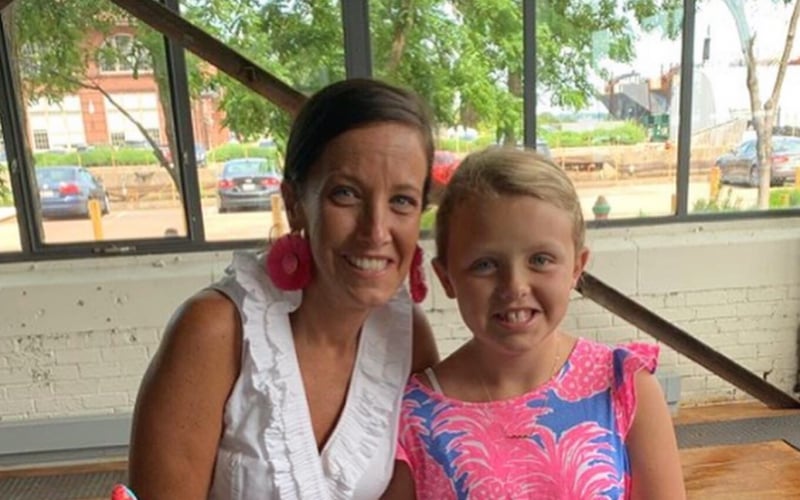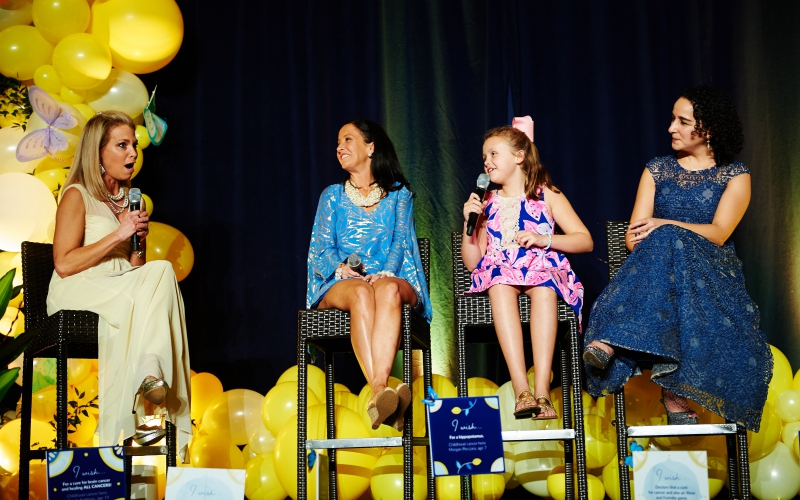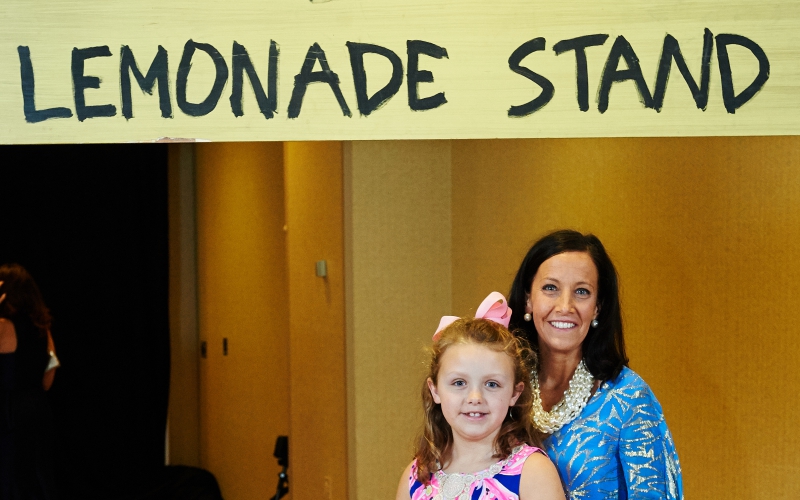By: Emily Gilger, neuroblastoma survivor and Edie’s Mom
My husband, Nick always tells people that without Alex’s Lemonade Stand Foundation (ALSF) and without the research you support, he would not have a family. And it’s true. My daughter Edie, me, my son Kinsey—none of us would be here if it weren’t for ALSF.
My daughter, Edie, was born June 7, 2009 in Lynchburg, Virginia.
When Edie was six months old, she was diagnosed with Stage 4 neuroblastoma. She had two tumors growing out of each adrenal gland crossing over her mid-section and invading her pancreas, kidneys, liver and stomach. Edie also had tumors around her spine.
Over the next several months, Edie had 14 rounds of chemotherapy and countless surgeries and procedures. Edie spent more time in the hospital than she did at home. We spent every major holiday in the hospital for the first two years of her life.
We went through the struggles of three relapses before we were finally referred to Children’s Hospital of Philadelphia (CHOP). It was at CHOP where we were first introduced to ALSF-funded researchers Dr. John Maris and Dr. Yael Mossé.
Once at CHOP, it was recommended that Edie have a simple blood test to see if by chance, she had the hereditary form of neuroblastoma, a rare type of neuroblastoma that is driven by the ALK gene. The results were positive and it was that blood test that changed the course of Edie’s treatment, and her life.
Dr. Mossé told us they had a trial drug for hereditary neuroblastoma and Edie would be a perfect candidate for the study.
I will never forget when they brought the trial drug in the room to give Edie her first dose. It was in a plain white bottle and written on it was the drug number (it didn’t even have a name yet), her name, and the dosage. I had never seen anything like this. And Edie would tell you she had never tasted anything as nasty as that drug was.
Edie took the medicine for 28 days. On the last day, Edie had scans to see if the medicine had done anything to her tumors. After the scans, we headed to the clinic to meet with Dr. Mossé. I remember that I kept telling myself that I needed to be strong for Edie. If the news wasn’t what we wanted that was ok, because we had only given the medicine 28 days to work.
Once inside the room, Dr. Mossé gave us the best gift ever. She told us the news that we had been waiting to hear for so long:
Edie was cancer-free!
After just 28 days on this drug, every single tumor in her body had vanished. It was a true miracle. Edie continued on the trial drug, which was later named Crizotinib, for the next four years. Taking the medicine did not slow her down one bit. She was finally able to live the life of a toddler and then little girl. She went to preschool, played soccer, took ballet and loved life to the fullest.
I would like to say that was the end of our story. But, unfortunately, that was not the case. My husband, Nick and I were given the same blood test as Edie, and my results came back positive. I carry the same ALK gene as Edie.
In the fall of 2013, we found out that I was pregnant with our second child. At 15 weeks pregnant, our baby had a genetic test and the results revealed that the baby did not carry the ALK gene—we were overjoyed.
But, at 29 weeks pregnant, I started having debilitating pain up the sides of my back. I was admitted to our local hospital for testing.
After a CT scan, an MRI and lots of bloodwork. I was diagnosed with neuroblastoma. In order to start treatment, I had to deliver our son, Robert Kinsey Vaughan Gilger, at only 30 weeks. Since he was born so early, I was only able to give him a quick kiss before he was taken to the NICU, where he spent the next nine weeks. While Robert learned to breathe and grew big enough to come home, I began my treatment for neuroblastoma.
At five days postpartum, I started Crizotinib, the same drug that saved Edie’s life.
After 8 months, my tumors remained stable, and we decided that it was time for surgery to remove them. The surgery was a huge success and I continued to take Crizotinib for another two and a half years. I have now been off the medicine for about two years.
Edie and I travel to CHOP three times a year for scans and clinic visits with Dr. Mossé. I am happy to report that so far all of the scans have been clear. We both remain cancer-free. Without the support of ALSF, the breakthrough research we needed may never have happened. Without this breakthrough, our family would not exist.
Emily lives in Lexington, South Carolina with her husband, Nick and their two children, Edie and Kinsey. She is a stay at home mama and runs a monogramming & embroidery business out of her house. She enjoys time on Lake Murray, exercising and spending time with her family & friends. Learn more about Emily and Edie here.
Funded by an ALSF Reach grant, Dr. Yael Mossé led the research team at Children’s Hospital of Philadelphia that made Emily and Edie's treatments possible. Her team theorized that since Crizotinib worked in ALK-positive lung cancer in adults, it could be the hope children battling ALK-positive cancer needed. And since Crizotinib is a targeted therapy that just attacks one gene, it has fewer side effects as compared to chemotherapy. Learn more about Edie's breakthrough treatment here.




